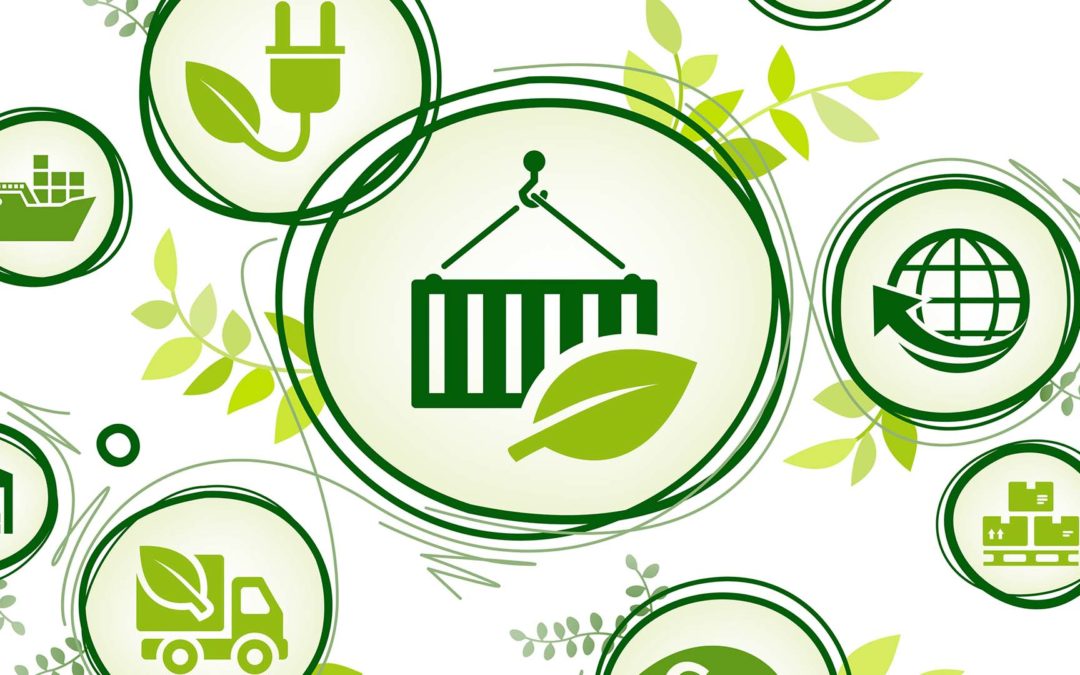How companies are navigating the complexities of supply chain sustainability, developing networks and adhering to today’s environmental, social and governance standards.
If 2021 was the year that companies found innovative new ways to overcome disruptive forces in their supply chains, 2022 may be the year that organizations devote additional time and attention to creating more sustainable networks. Knowing that business partners, employees, investors and customers are all asking for this, the race is on to build out and nurture supply chains that support greater environmental stewardship and social responsibility.
“For many businesses, supply chains have come into focus because they use a lot of resources and money and are frequently a source of unnecessary waste,” David Luther writes in Supply Chain Sustainability: Why It Is Important & Best Practices. “Thus, supply chain sustainability has emerged as a key corporate goal. Companies have started to measure the environmental and societal impact of their goods and services, from the beginning to the end of their lifecycles.”
Embracing ESG
To stay at the top of their games this year, companies will need to embrace environmental, social and governance (ESG) and supply chain models that appeal to customers, business partners, employees and shareholders alike. “While any progress a company makes to embrace ESG goals is important,” JD Supra points out, “only those companies that truly grasp the concepts and weave them into their core mission and vision will emerge as winners.”
And while pre-pandemic supply chains were largely up to their owner’s discretion and rarely made global headlines, the environment changed dramatically when shortages of basics like toilet paper and face masks splashed across all news outlets in 2020. The following year didn’t offer much relief from the supply chain shortages, and in fact exacerbated them as economies fired back up just as producers were dealing with everything from labor shortages to port congestion to escalating freight rates.
“The discussion of supply chains placed focus on issues surrounding the heavy reliance on globalization and concerns that result when there are delays, shortages, or unexpected circumstances (e.g., Covid),” JD Supra explains. “Despite these splashy headlines, other companies were making waves of their own with the adoption of more stringent ESG standards. While not all companies have fully embraced ESG, taking a proactive approach to building a sustainable supply chain is the path forward.”
Addressing Supply Chain Issues
According to Accenture, supply chains generate 60% of global emissions and hold 5.5 times more carbon intensity than the rest of the business. It sees commitments to net zero commitments that incorporate carbon-neutral products, production and supply chain; circular economies (going beyond single-use products); and earning trust by mitigating negative environmental and societal impacts as some of the key strategies organizations are using to create more sustainable supply chains.
Accenture also sees technology as a viable tool for companies that are committed to operating more sustainably. “Using digital technology, including supply chain analytics, you can actually measure trust with stakeholders,” says Accenture, which combines artificial intelligence (AI) with ESG data to assess companies’ sustainability. “The result? Transparency and a greater understanding of key stakeholder trust.”
The Path Forward
The question now is, what are organizations doing to make their supply chains even more sustainable, their products and practices more environmentally friendly, and their work places more welcoming and inclusive? JD Supra says many consumer companies are pushing for new ESG standards and certifications that will help them achieve competitive advantage in the market.
Certified B Corps, for example, are companies that meet the highest standards of verified social and environmental performance, public transparency, and legal accountability to balance profit and purpose. Administered by B Lab Global, the certification is one of several ways companies can broaden their views of ESG and supply chain sustainability in an era where Gartner says 85% of investors consider such factors when making investment decisions. “Companies cannot afford to sit idly by and watch from the sidelines,” JD Supra concludes. “With the call from investors amplifying the ESG call from customers, companies must act now.”
.jpg)
IntelliTrans’ Global Control Tower provides high levels of supply chain transparency; aggregates, completes, and enhances data from a variety of sources; offers visibility into and execution of different aspects of the supply chain; and generates data-driven alerts and analytics that ask deeper questions and deliver meaningful insights.
By leveraging tracking information, the Global Control Tower provides analytics that measures key performance indicators (KPIs) like fleet cycle time, origin/destination dwell time, lane and hauler performance, back orders, freight spend, load optimization, and more. With their rate, equipment, lease, tracking, and invoice data in a central repository that’s accessible 24/7, companies can position themselves for success in any market conditions.

